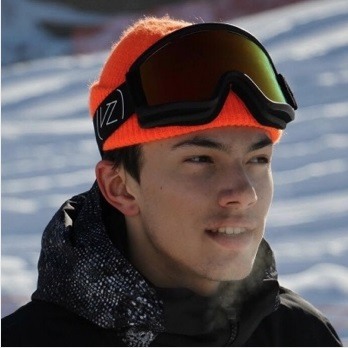News Based on facts, either observed and verified directly by the reporter, or reported and verified from knowledgeable sources.
Flying high Dene snowboarder added to Canada’s Olympics roster
 Snowboarder Liam Gill of the Liidlii Kue First Nation will be competing in the halfpipe for Team Canada in the 2022 Beijing Olympics. (Photo courtesy of Canada Snowboard)
Indian Country Today
Snowboarder Liam Gill of the Liidlii Kue First Nation will be competing in the halfpipe for Team Canada in the 2022 Beijing Olympics. (Photo courtesy of Canada Snowboard)
Indian Country Today
By Miles Morrisseau
Indian Country Today
Four days before the opening of the Beijing Olympics, 18-year-old snowboarder Liam Gill of the Liidlii Kue First Nation in the Northwest Territories found out he needed to pack his bags for China.
Canada Snowboard announced Monday, Jan. 31, that Gill would be competing in the Beijing Olympics after snowboarder Derek Livingston sustained a lower-body injury following a training run and would not be able to participate.
“I’m devastated that I won’t be able to compete for Canada at the Olympics, but I’m super excited for Liam and can’t wait to watch my fellow Canadians at the games,” said Livingston, one of Canada’s most experienced Olympic snowboarders and someone the teenage Gill has idolized.
Gill becomes the third Indigenous member of Canada’s Olympics team, joining with women hockey players Jocelyne Larocque and Jamie Lee Rattray. He will be competing in the halfpipe event.
“I woke up to the news and I didn’t know how to feel,” Gill said in a statement. “Derek is an idol of mine who has pretty much brought me through the past few years. So, when I thought about going to the games I wanted to go with Derek.”
Halfpipe is the most well-known of the snowboarding competitions. As its name suggests, the boarders compete on a halfpipe structure sloped down a snow-covered hill, performing complicated tricks as they swoop back and forth. It is one of the Olympic Games’ most popular, non-traditional sports, bringing in the X-games audience since it was first introduced at the Nagano Games in 1998.
It is also one of the Winter Olympic sports with a genuine global star who carries the hardware to prove it. This is still Shaun White’s hill and the 35-year-old from the U.S. will be going for his fourth gold medal at Beijing.
Gill will be the second-youngest member of the Canadian snowboarding contingent. The rising halfpipe star is having his Olympic dreams come to life after quickly transitioning from alternate to Olympic athlete only days before the team charter left for Beijing.
“I had totally given up on any hope of going and hadn’t even packed my stuff. I am stoked to be going,” Gill said.
He has been heating up at the right time. In the five International Federation of Skiing Olympic qualifying and World Cup events leading up to the Olympics, Gill had some of his best finishes, including 12th place at Laax Switzerland and his first top 10 finish at Copper Mountain, Colorado, in December.
In all of those competitions Gill placed ahead of Livingston and all other Canadian athletes. His standing on the FIS points charts continued to rise all season moving quickly from 78th to 36th.
“I have a few runs up my sleeve and really want to make it count,” Gill said.
He is the only Indigenous athlete on the Canadian snowboard team and is proud to represent his nation and his country. The competition begins Feb. 9, with the gold medal runs set for Feb. 11 at the Genting Snow Park H & S Stadium.
Canada appears to have the largest contingent of Indigenous athletes competing in the Winter Olympics. The U.S. has one Indigenous athlete, woman hockey standout Abby Roque. A review by Indian Country Today, however, did not find another nation with an Indigenous athlete competing.
Miles Morrisseau, a citizen of the Métis Nation, is a writer/producer based in the historic Métis Community of Grand Rapids, Manitoba, Canada. He reported as a national Native Affairs broadcaster for CBC Radio and is former editor-in-chief of Indian Country Today.
Indian Country Today is an independent, nonprofit news organization that covers the Indigenous world with a daily digital platform and weekday news broadcast with international viewership.
